Mental Health Report: Status, Factors, and Recovery Principles
VerifiedAdded on 2023/06/09
|11
|2664
|265
Report
AI Summary
This report provides an in-depth analysis of a client's mental health status, focusing on mood and thought content as key components of the mental status examination. It identifies factors contributing to the client's current mental health status, using the stress-vulnerability model to explain the interplay of stress, coping skills, and vulnerability. The report also discusses principles of mental health recovery, emphasizing hope, respect, and empowerment, and highlights urgent risk areas such as suicidal ideations. Furthermore, it addresses mental health concerns and proposes interventions like family therapy to resolve conflicts and provide support. The report concludes by touching on legal, ethical, and professional issues in healthcare.
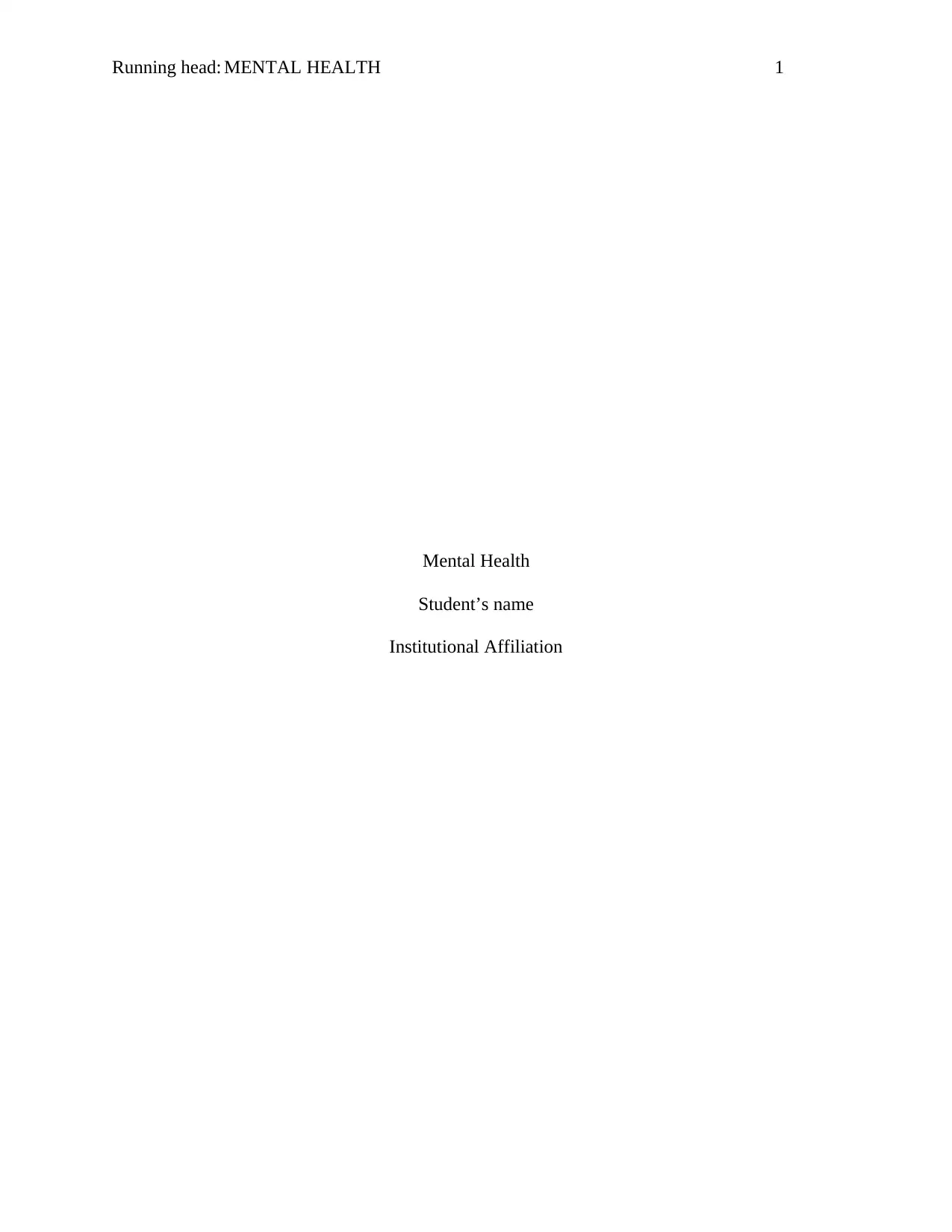
Running head: MENTAL HEALTH 1
Mental Health
Student’s name
Institutional Affiliation
Mental Health
Student’s name
Institutional Affiliation
Paraphrase This Document
Need a fresh take? Get an instant paraphrase of this document with our AI Paraphraser
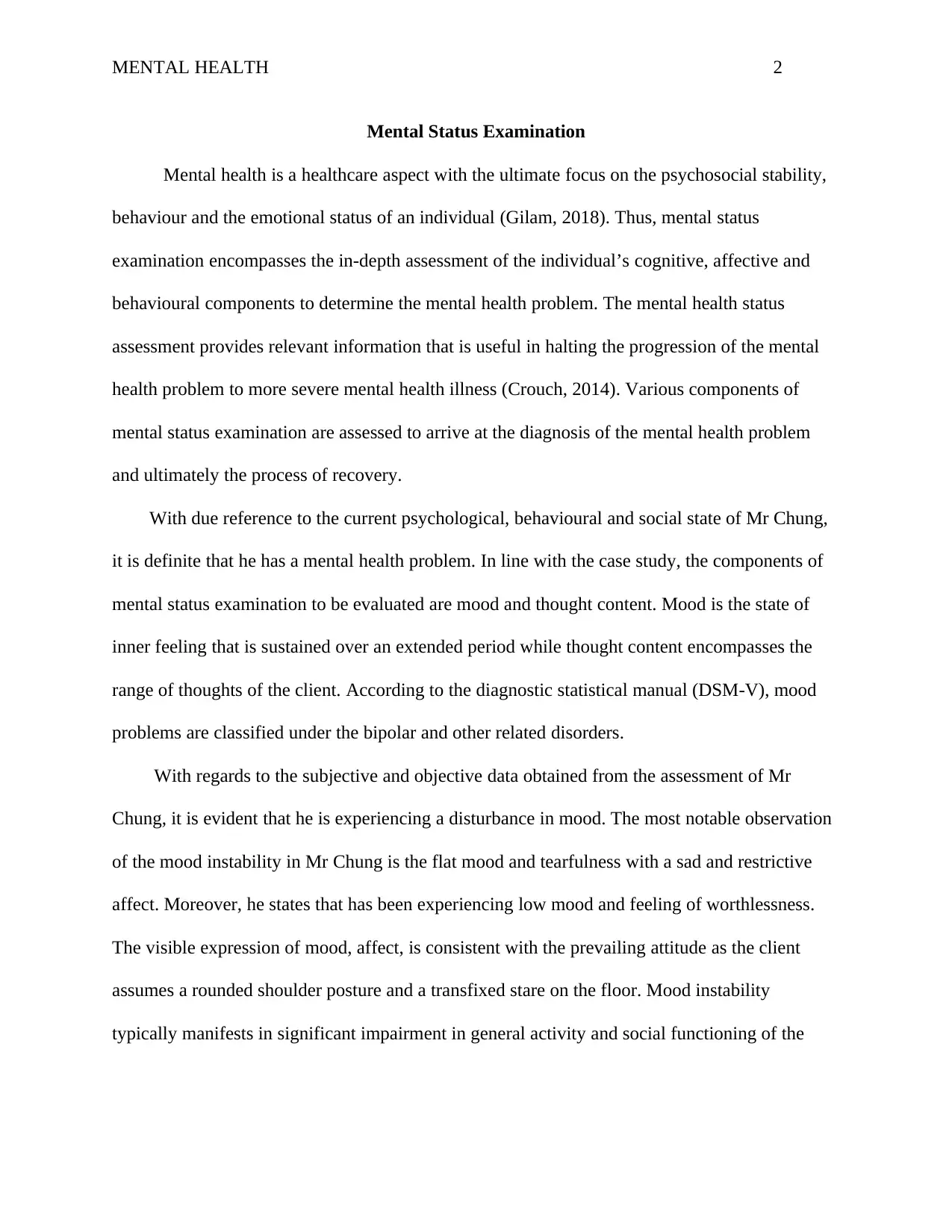
MENTAL HEALTH 2
Mental Status Examination
Mental health is a healthcare aspect with the ultimate focus on the psychosocial stability,
behaviour and the emotional status of an individual (Gilam, 2018). Thus, mental status
examination encompasses the in-depth assessment of the individual’s cognitive, affective and
behavioural components to determine the mental health problem. The mental health status
assessment provides relevant information that is useful in halting the progression of the mental
health problem to more severe mental health illness (Crouch, 2014). Various components of
mental status examination are assessed to arrive at the diagnosis of the mental health problem
and ultimately the process of recovery.
With due reference to the current psychological, behavioural and social state of Mr Chung,
it is definite that he has a mental health problem. In line with the case study, the components of
mental status examination to be evaluated are mood and thought content. Mood is the state of
inner feeling that is sustained over an extended period while thought content encompasses the
range of thoughts of the client. According to the diagnostic statistical manual (DSM-V), mood
problems are classified under the bipolar and other related disorders.
With regards to the subjective and objective data obtained from the assessment of Mr
Chung, it is evident that he is experiencing a disturbance in mood. The most notable observation
of the mood instability in Mr Chung is the flat mood and tearfulness with a sad and restrictive
affect. Moreover, he states that has been experiencing low mood and feeling of worthlessness.
The visible expression of mood, affect, is consistent with the prevailing attitude as the client
assumes a rounded shoulder posture and a transfixed stare on the floor. Mood instability
typically manifests in significant impairment in general activity and social functioning of the
Mental Status Examination
Mental health is a healthcare aspect with the ultimate focus on the psychosocial stability,
behaviour and the emotional status of an individual (Gilam, 2018). Thus, mental status
examination encompasses the in-depth assessment of the individual’s cognitive, affective and
behavioural components to determine the mental health problem. The mental health status
assessment provides relevant information that is useful in halting the progression of the mental
health problem to more severe mental health illness (Crouch, 2014). Various components of
mental status examination are assessed to arrive at the diagnosis of the mental health problem
and ultimately the process of recovery.
With due reference to the current psychological, behavioural and social state of Mr Chung,
it is definite that he has a mental health problem. In line with the case study, the components of
mental status examination to be evaluated are mood and thought content. Mood is the state of
inner feeling that is sustained over an extended period while thought content encompasses the
range of thoughts of the client. According to the diagnostic statistical manual (DSM-V), mood
problems are classified under the bipolar and other related disorders.
With regards to the subjective and objective data obtained from the assessment of Mr
Chung, it is evident that he is experiencing a disturbance in mood. The most notable observation
of the mood instability in Mr Chung is the flat mood and tearfulness with a sad and restrictive
affect. Moreover, he states that has been experiencing low mood and feeling of worthlessness.
The visible expression of mood, affect, is consistent with the prevailing attitude as the client
assumes a rounded shoulder posture and a transfixed stare on the floor. Mood instability
typically manifests in significant impairment in general activity and social functioning of the
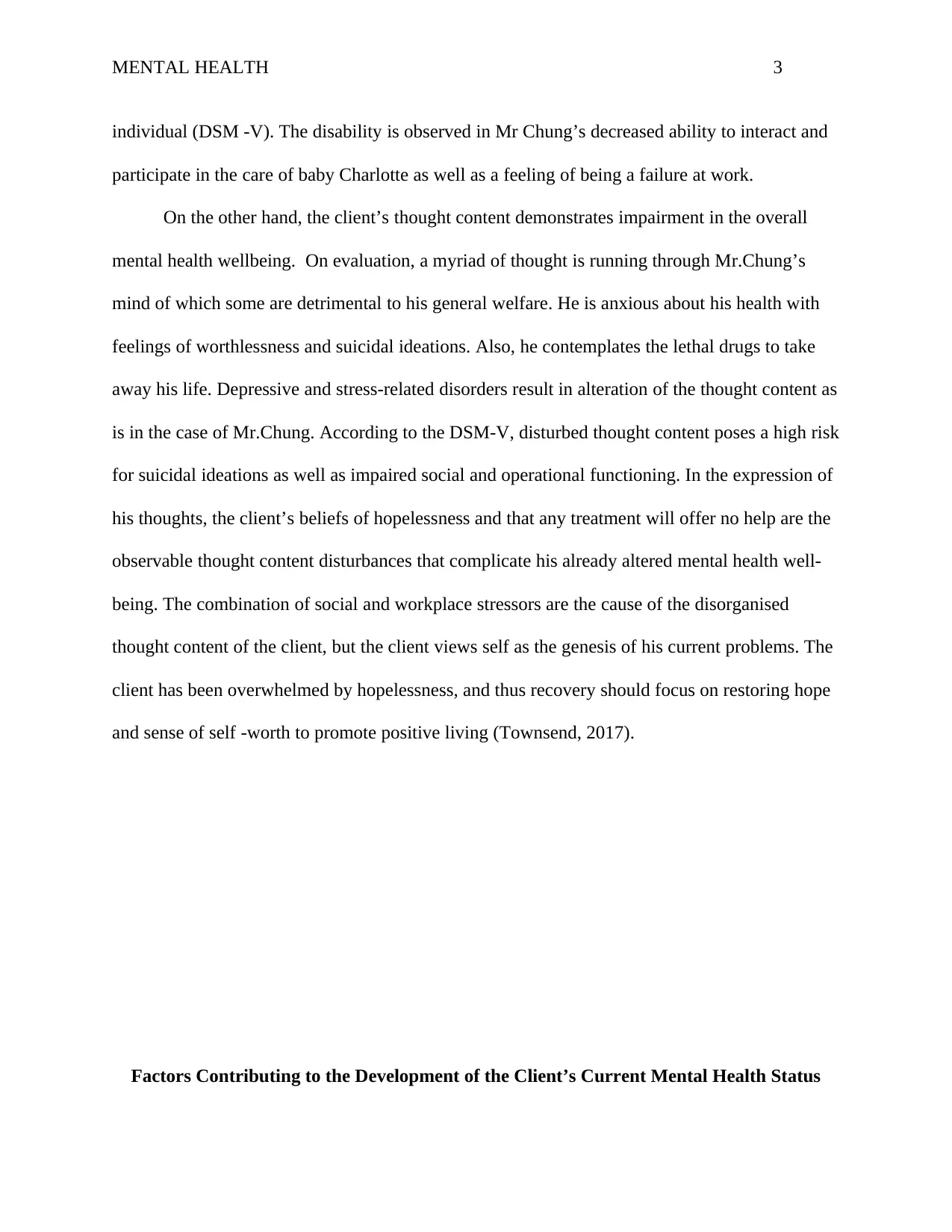
MENTAL HEALTH 3
individual (DSM -V). The disability is observed in Mr Chung’s decreased ability to interact and
participate in the care of baby Charlotte as well as a feeling of being a failure at work.
On the other hand, the client’s thought content demonstrates impairment in the overall
mental health wellbeing. On evaluation, a myriad of thought is running through Mr.Chung’s
mind of which some are detrimental to his general welfare. He is anxious about his health with
feelings of worthlessness and suicidal ideations. Also, he contemplates the lethal drugs to take
away his life. Depressive and stress-related disorders result in alteration of the thought content as
is in the case of Mr.Chung. According to the DSM-V, disturbed thought content poses a high risk
for suicidal ideations as well as impaired social and operational functioning. In the expression of
his thoughts, the client’s beliefs of hopelessness and that any treatment will offer no help are the
observable thought content disturbances that complicate his already altered mental health well-
being. The combination of social and workplace stressors are the cause of the disorganised
thought content of the client, but the client views self as the genesis of his current problems. The
client has been overwhelmed by hopelessness, and thus recovery should focus on restoring hope
and sense of self -worth to promote positive living (Townsend, 2017).
Factors Contributing to the Development of the Client’s Current Mental Health Status
individual (DSM -V). The disability is observed in Mr Chung’s decreased ability to interact and
participate in the care of baby Charlotte as well as a feeling of being a failure at work.
On the other hand, the client’s thought content demonstrates impairment in the overall
mental health wellbeing. On evaluation, a myriad of thought is running through Mr.Chung’s
mind of which some are detrimental to his general welfare. He is anxious about his health with
feelings of worthlessness and suicidal ideations. Also, he contemplates the lethal drugs to take
away his life. Depressive and stress-related disorders result in alteration of the thought content as
is in the case of Mr.Chung. According to the DSM-V, disturbed thought content poses a high risk
for suicidal ideations as well as impaired social and operational functioning. In the expression of
his thoughts, the client’s beliefs of hopelessness and that any treatment will offer no help are the
observable thought content disturbances that complicate his already altered mental health well-
being. The combination of social and workplace stressors are the cause of the disorganised
thought content of the client, but the client views self as the genesis of his current problems. The
client has been overwhelmed by hopelessness, and thus recovery should focus on restoring hope
and sense of self -worth to promote positive living (Townsend, 2017).
Factors Contributing to the Development of the Client’s Current Mental Health Status
⊘ This is a preview!⊘
Do you want full access?
Subscribe today to unlock all pages.

Trusted by 1+ million students worldwide
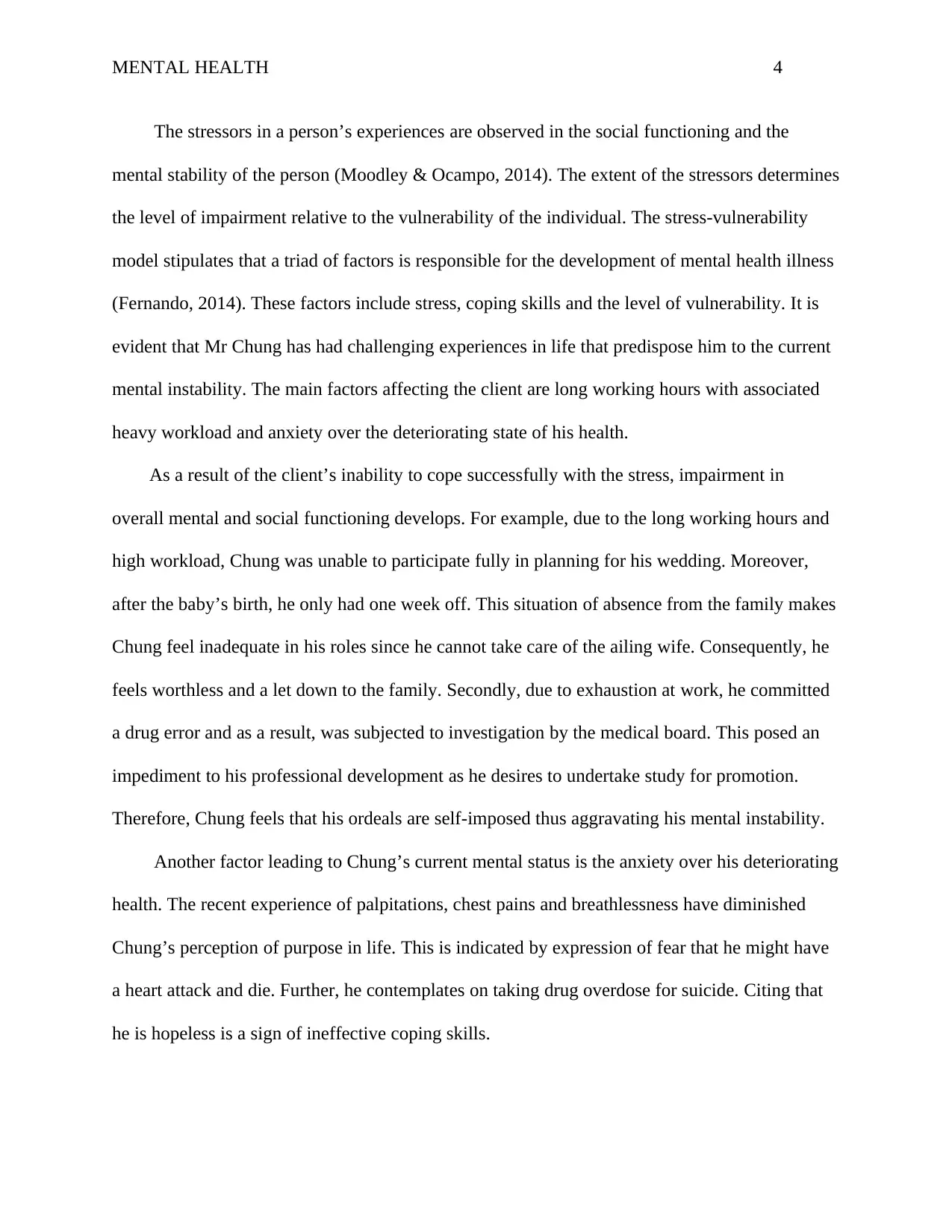
MENTAL HEALTH 4
The stressors in a person’s experiences are observed in the social functioning and the
mental stability of the person (Moodley & Ocampo, 2014). The extent of the stressors determines
the level of impairment relative to the vulnerability of the individual. The stress-vulnerability
model stipulates that a triad of factors is responsible for the development of mental health illness
(Fernando, 2014). These factors include stress, coping skills and the level of vulnerability. It is
evident that Mr Chung has had challenging experiences in life that predispose him to the current
mental instability. The main factors affecting the client are long working hours with associated
heavy workload and anxiety over the deteriorating state of his health.
As a result of the client’s inability to cope successfully with the stress, impairment in
overall mental and social functioning develops. For example, due to the long working hours and
high workload, Chung was unable to participate fully in planning for his wedding. Moreover,
after the baby’s birth, he only had one week off. This situation of absence from the family makes
Chung feel inadequate in his roles since he cannot take care of the ailing wife. Consequently, he
feels worthless and a let down to the family. Secondly, due to exhaustion at work, he committed
a drug error and as a result, was subjected to investigation by the medical board. This posed an
impediment to his professional development as he desires to undertake study for promotion.
Therefore, Chung feels that his ordeals are self-imposed thus aggravating his mental instability.
Another factor leading to Chung’s current mental status is the anxiety over his deteriorating
health. The recent experience of palpitations, chest pains and breathlessness have diminished
Chung’s perception of purpose in life. This is indicated by expression of fear that he might have
a heart attack and die. Further, he contemplates on taking drug overdose for suicide. Citing that
he is hopeless is a sign of ineffective coping skills.
The stressors in a person’s experiences are observed in the social functioning and the
mental stability of the person (Moodley & Ocampo, 2014). The extent of the stressors determines
the level of impairment relative to the vulnerability of the individual. The stress-vulnerability
model stipulates that a triad of factors is responsible for the development of mental health illness
(Fernando, 2014). These factors include stress, coping skills and the level of vulnerability. It is
evident that Mr Chung has had challenging experiences in life that predispose him to the current
mental instability. The main factors affecting the client are long working hours with associated
heavy workload and anxiety over the deteriorating state of his health.
As a result of the client’s inability to cope successfully with the stress, impairment in
overall mental and social functioning develops. For example, due to the long working hours and
high workload, Chung was unable to participate fully in planning for his wedding. Moreover,
after the baby’s birth, he only had one week off. This situation of absence from the family makes
Chung feel inadequate in his roles since he cannot take care of the ailing wife. Consequently, he
feels worthless and a let down to the family. Secondly, due to exhaustion at work, he committed
a drug error and as a result, was subjected to investigation by the medical board. This posed an
impediment to his professional development as he desires to undertake study for promotion.
Therefore, Chung feels that his ordeals are self-imposed thus aggravating his mental instability.
Another factor leading to Chung’s current mental status is the anxiety over his deteriorating
health. The recent experience of palpitations, chest pains and breathlessness have diminished
Chung’s perception of purpose in life. This is indicated by expression of fear that he might have
a heart attack and die. Further, he contemplates on taking drug overdose for suicide. Citing that
he is hopeless is a sign of ineffective coping skills.
Paraphrase This Document
Need a fresh take? Get an instant paraphrase of this document with our AI Paraphraser
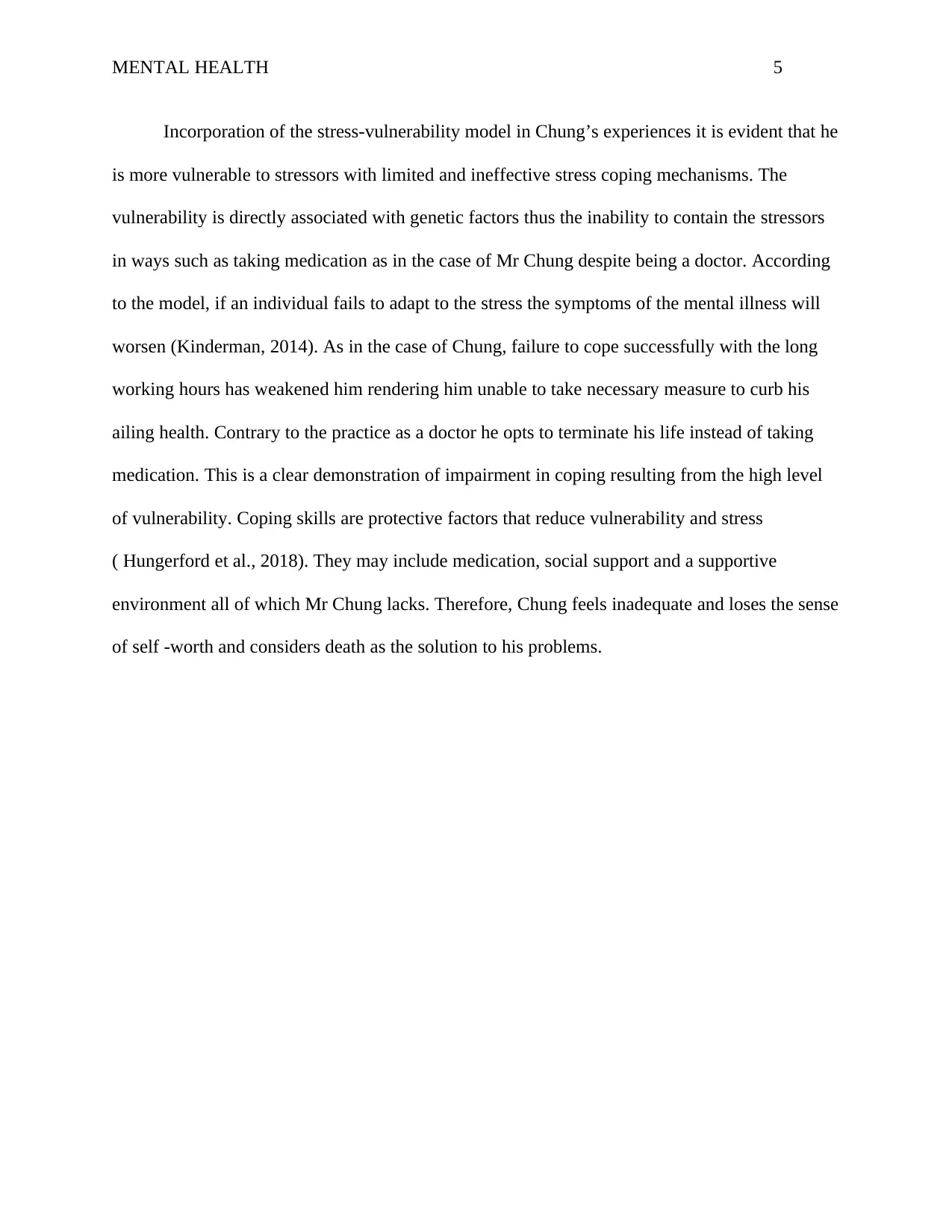
MENTAL HEALTH 5
Incorporation of the stress-vulnerability model in Chung’s experiences it is evident that he
is more vulnerable to stressors with limited and ineffective stress coping mechanisms. The
vulnerability is directly associated with genetic factors thus the inability to contain the stressors
in ways such as taking medication as in the case of Mr Chung despite being a doctor. According
to the model, if an individual fails to adapt to the stress the symptoms of the mental illness will
worsen (Kinderman, 2014). As in the case of Chung, failure to cope successfully with the long
working hours has weakened him rendering him unable to take necessary measure to curb his
ailing health. Contrary to the practice as a doctor he opts to terminate his life instead of taking
medication. This is a clear demonstration of impairment in coping resulting from the high level
of vulnerability. Coping skills are protective factors that reduce vulnerability and stress
( Hungerford et al., 2018). They may include medication, social support and a supportive
environment all of which Mr Chung lacks. Therefore, Chung feels inadequate and loses the sense
of self -worth and considers death as the solution to his problems.
Incorporation of the stress-vulnerability model in Chung’s experiences it is evident that he
is more vulnerable to stressors with limited and ineffective stress coping mechanisms. The
vulnerability is directly associated with genetic factors thus the inability to contain the stressors
in ways such as taking medication as in the case of Mr Chung despite being a doctor. According
to the model, if an individual fails to adapt to the stress the symptoms of the mental illness will
worsen (Kinderman, 2014). As in the case of Chung, failure to cope successfully with the long
working hours has weakened him rendering him unable to take necessary measure to curb his
ailing health. Contrary to the practice as a doctor he opts to terminate his life instead of taking
medication. This is a clear demonstration of impairment in coping resulting from the high level
of vulnerability. Coping skills are protective factors that reduce vulnerability and stress
( Hungerford et al., 2018). They may include medication, social support and a supportive
environment all of which Mr Chung lacks. Therefore, Chung feels inadequate and loses the sense
of self -worth and considers death as the solution to his problems.
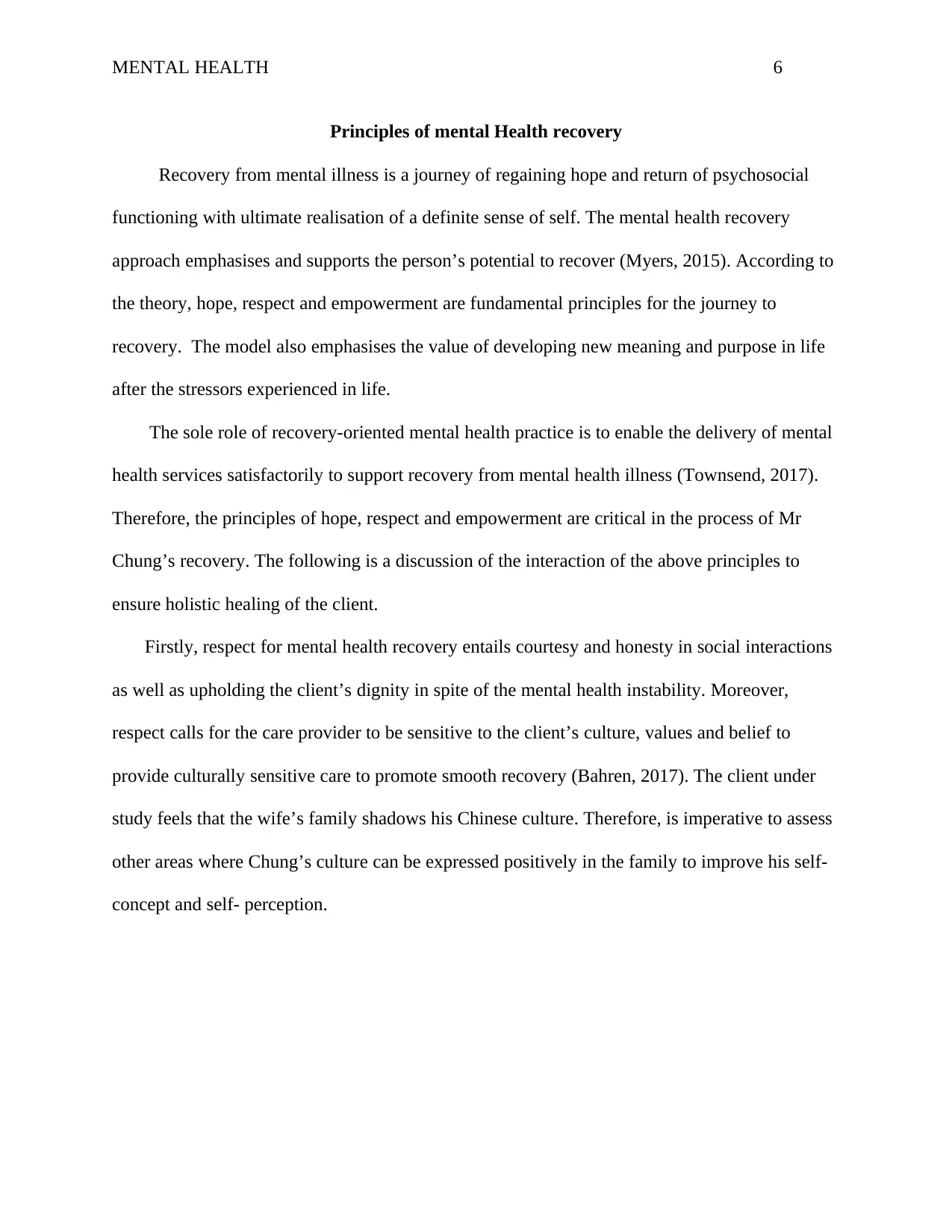
MENTAL HEALTH 6
Principles of mental Health recovery
Recovery from mental illness is a journey of regaining hope and return of psychosocial
functioning with ultimate realisation of a definite sense of self. The mental health recovery
approach emphasises and supports the person’s potential to recover (Myers, 2015). According to
the theory, hope, respect and empowerment are fundamental principles for the journey to
recovery. The model also emphasises the value of developing new meaning and purpose in life
after the stressors experienced in life.
The sole role of recovery-oriented mental health practice is to enable the delivery of mental
health services satisfactorily to support recovery from mental health illness (Townsend, 2017).
Therefore, the principles of hope, respect and empowerment are critical in the process of Mr
Chung’s recovery. The following is a discussion of the interaction of the above principles to
ensure holistic healing of the client.
Firstly, respect for mental health recovery entails courtesy and honesty in social interactions
as well as upholding the client’s dignity in spite of the mental health instability. Moreover,
respect calls for the care provider to be sensitive to the client’s culture, values and belief to
provide culturally sensitive care to promote smooth recovery (Bahren, 2017). The client under
study feels that the wife’s family shadows his Chinese culture. Therefore, is imperative to assess
other areas where Chung’s culture can be expressed positively in the family to improve his self-
concept and self- perception.
Principles of mental Health recovery
Recovery from mental illness is a journey of regaining hope and return of psychosocial
functioning with ultimate realisation of a definite sense of self. The mental health recovery
approach emphasises and supports the person’s potential to recover (Myers, 2015). According to
the theory, hope, respect and empowerment are fundamental principles for the journey to
recovery. The model also emphasises the value of developing new meaning and purpose in life
after the stressors experienced in life.
The sole role of recovery-oriented mental health practice is to enable the delivery of mental
health services satisfactorily to support recovery from mental health illness (Townsend, 2017).
Therefore, the principles of hope, respect and empowerment are critical in the process of Mr
Chung’s recovery. The following is a discussion of the interaction of the above principles to
ensure holistic healing of the client.
Firstly, respect for mental health recovery entails courtesy and honesty in social interactions
as well as upholding the client’s dignity in spite of the mental health instability. Moreover,
respect calls for the care provider to be sensitive to the client’s culture, values and belief to
provide culturally sensitive care to promote smooth recovery (Bahren, 2017). The client under
study feels that the wife’s family shadows his Chinese culture. Therefore, is imperative to assess
other areas where Chung’s culture can be expressed positively in the family to improve his self-
concept and self- perception.
⊘ This is a preview!⊘
Do you want full access?
Subscribe today to unlock all pages.

Trusted by 1+ million students worldwide
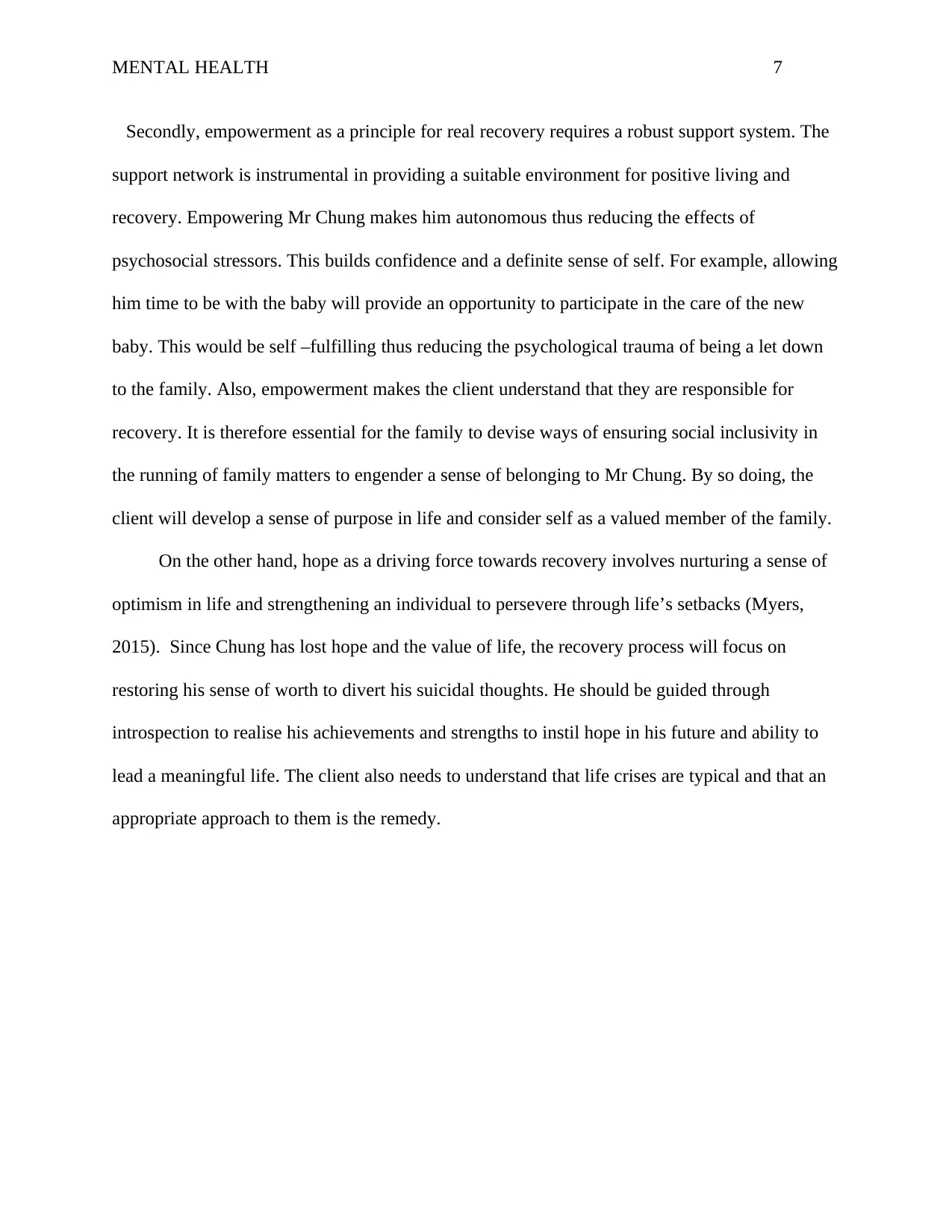
MENTAL HEALTH 7
Secondly, empowerment as a principle for real recovery requires a robust support system. The
support network is instrumental in providing a suitable environment for positive living and
recovery. Empowering Mr Chung makes him autonomous thus reducing the effects of
psychosocial stressors. This builds confidence and a definite sense of self. For example, allowing
him time to be with the baby will provide an opportunity to participate in the care of the new
baby. This would be self –fulfilling thus reducing the psychological trauma of being a let down
to the family. Also, empowerment makes the client understand that they are responsible for
recovery. It is therefore essential for the family to devise ways of ensuring social inclusivity in
the running of family matters to engender a sense of belonging to Mr Chung. By so doing, the
client will develop a sense of purpose in life and consider self as a valued member of the family.
On the other hand, hope as a driving force towards recovery involves nurturing a sense of
optimism in life and strengthening an individual to persevere through life’s setbacks (Myers,
2015). Since Chung has lost hope and the value of life, the recovery process will focus on
restoring his sense of worth to divert his suicidal thoughts. He should be guided through
introspection to realise his achievements and strengths to instil hope in his future and ability to
lead a meaningful life. The client also needs to understand that life crises are typical and that an
appropriate approach to them is the remedy.
Secondly, empowerment as a principle for real recovery requires a robust support system. The
support network is instrumental in providing a suitable environment for positive living and
recovery. Empowering Mr Chung makes him autonomous thus reducing the effects of
psychosocial stressors. This builds confidence and a definite sense of self. For example, allowing
him time to be with the baby will provide an opportunity to participate in the care of the new
baby. This would be self –fulfilling thus reducing the psychological trauma of being a let down
to the family. Also, empowerment makes the client understand that they are responsible for
recovery. It is therefore essential for the family to devise ways of ensuring social inclusivity in
the running of family matters to engender a sense of belonging to Mr Chung. By so doing, the
client will develop a sense of purpose in life and consider self as a valued member of the family.
On the other hand, hope as a driving force towards recovery involves nurturing a sense of
optimism in life and strengthening an individual to persevere through life’s setbacks (Myers,
2015). Since Chung has lost hope and the value of life, the recovery process will focus on
restoring his sense of worth to divert his suicidal thoughts. He should be guided through
introspection to realise his achievements and strengths to instil hope in his future and ability to
lead a meaningful life. The client also needs to understand that life crises are typical and that an
appropriate approach to them is the remedy.
Paraphrase This Document
Need a fresh take? Get an instant paraphrase of this document with our AI Paraphraser
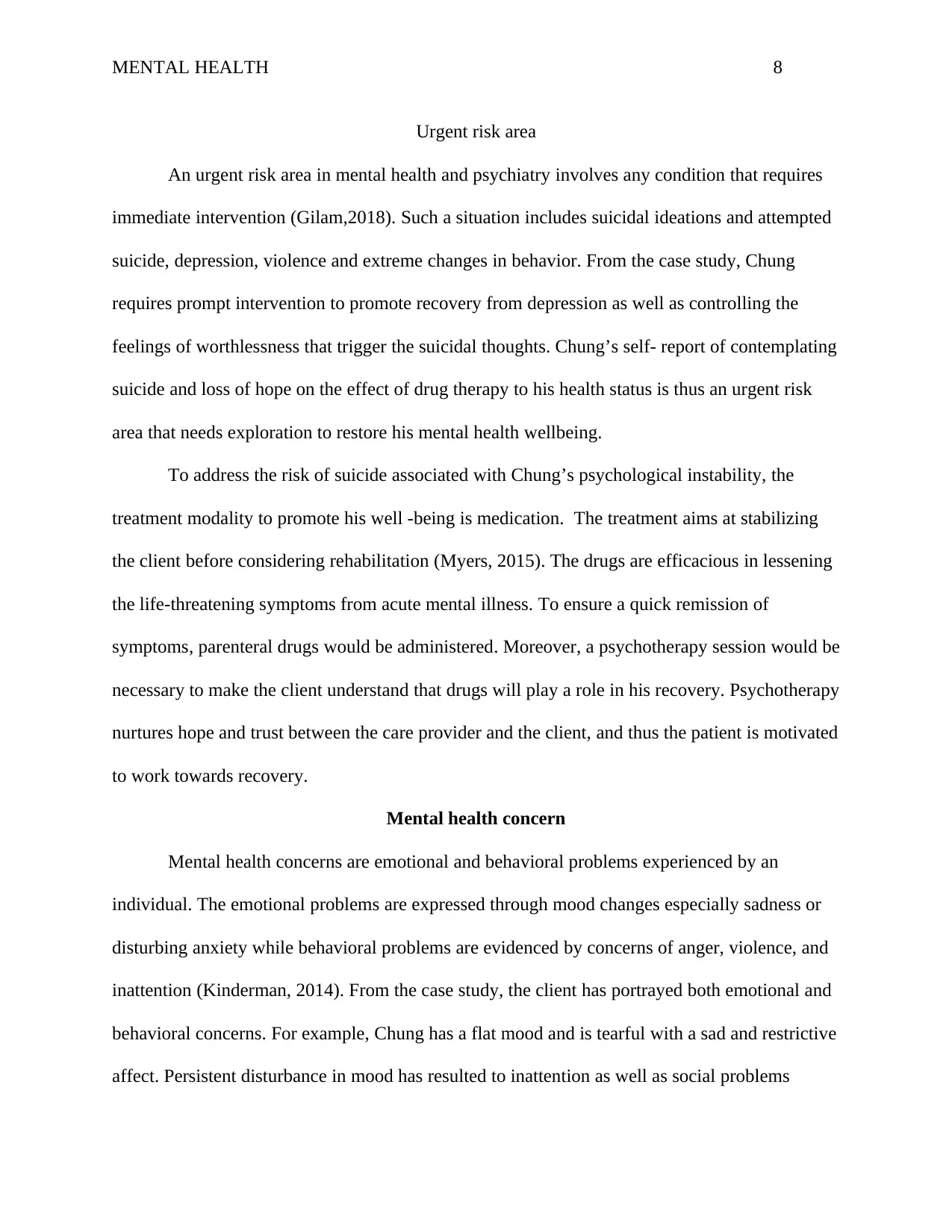
MENTAL HEALTH 8
Urgent risk area
An urgent risk area in mental health and psychiatry involves any condition that requires
immediate intervention (Gilam,2018). Such a situation includes suicidal ideations and attempted
suicide, depression, violence and extreme changes in behavior. From the case study, Chung
requires prompt intervention to promote recovery from depression as well as controlling the
feelings of worthlessness that trigger the suicidal thoughts. Chung’s self- report of contemplating
suicide and loss of hope on the effect of drug therapy to his health status is thus an urgent risk
area that needs exploration to restore his mental health wellbeing.
To address the risk of suicide associated with Chung’s psychological instability, the
treatment modality to promote his well -being is medication. The treatment aims at stabilizing
the client before considering rehabilitation (Myers, 2015). The drugs are efficacious in lessening
the life-threatening symptoms from acute mental illness. To ensure a quick remission of
symptoms, parenteral drugs would be administered. Moreover, a psychotherapy session would be
necessary to make the client understand that drugs will play a role in his recovery. Psychotherapy
nurtures hope and trust between the care provider and the client, and thus the patient is motivated
to work towards recovery.
Mental health concern
Mental health concerns are emotional and behavioral problems experienced by an
individual. The emotional problems are expressed through mood changes especially sadness or
disturbing anxiety while behavioral problems are evidenced by concerns of anger, violence, and
inattention (Kinderman, 2014). From the case study, the client has portrayed both emotional and
behavioral concerns. For example, Chung has a flat mood and is tearful with a sad and restrictive
affect. Persistent disturbance in mood has resulted to inattention as well as social problems
Urgent risk area
An urgent risk area in mental health and psychiatry involves any condition that requires
immediate intervention (Gilam,2018). Such a situation includes suicidal ideations and attempted
suicide, depression, violence and extreme changes in behavior. From the case study, Chung
requires prompt intervention to promote recovery from depression as well as controlling the
feelings of worthlessness that trigger the suicidal thoughts. Chung’s self- report of contemplating
suicide and loss of hope on the effect of drug therapy to his health status is thus an urgent risk
area that needs exploration to restore his mental health wellbeing.
To address the risk of suicide associated with Chung’s psychological instability, the
treatment modality to promote his well -being is medication. The treatment aims at stabilizing
the client before considering rehabilitation (Myers, 2015). The drugs are efficacious in lessening
the life-threatening symptoms from acute mental illness. To ensure a quick remission of
symptoms, parenteral drugs would be administered. Moreover, a psychotherapy session would be
necessary to make the client understand that drugs will play a role in his recovery. Psychotherapy
nurtures hope and trust between the care provider and the client, and thus the patient is motivated
to work towards recovery.
Mental health concern
Mental health concerns are emotional and behavioral problems experienced by an
individual. The emotional problems are expressed through mood changes especially sadness or
disturbing anxiety while behavioral problems are evidenced by concerns of anger, violence, and
inattention (Kinderman, 2014). From the case study, the client has portrayed both emotional and
behavioral concerns. For example, Chung has a flat mood and is tearful with a sad and restrictive
affect. Persistent disturbance in mood has resulted to inattention as well as social problems
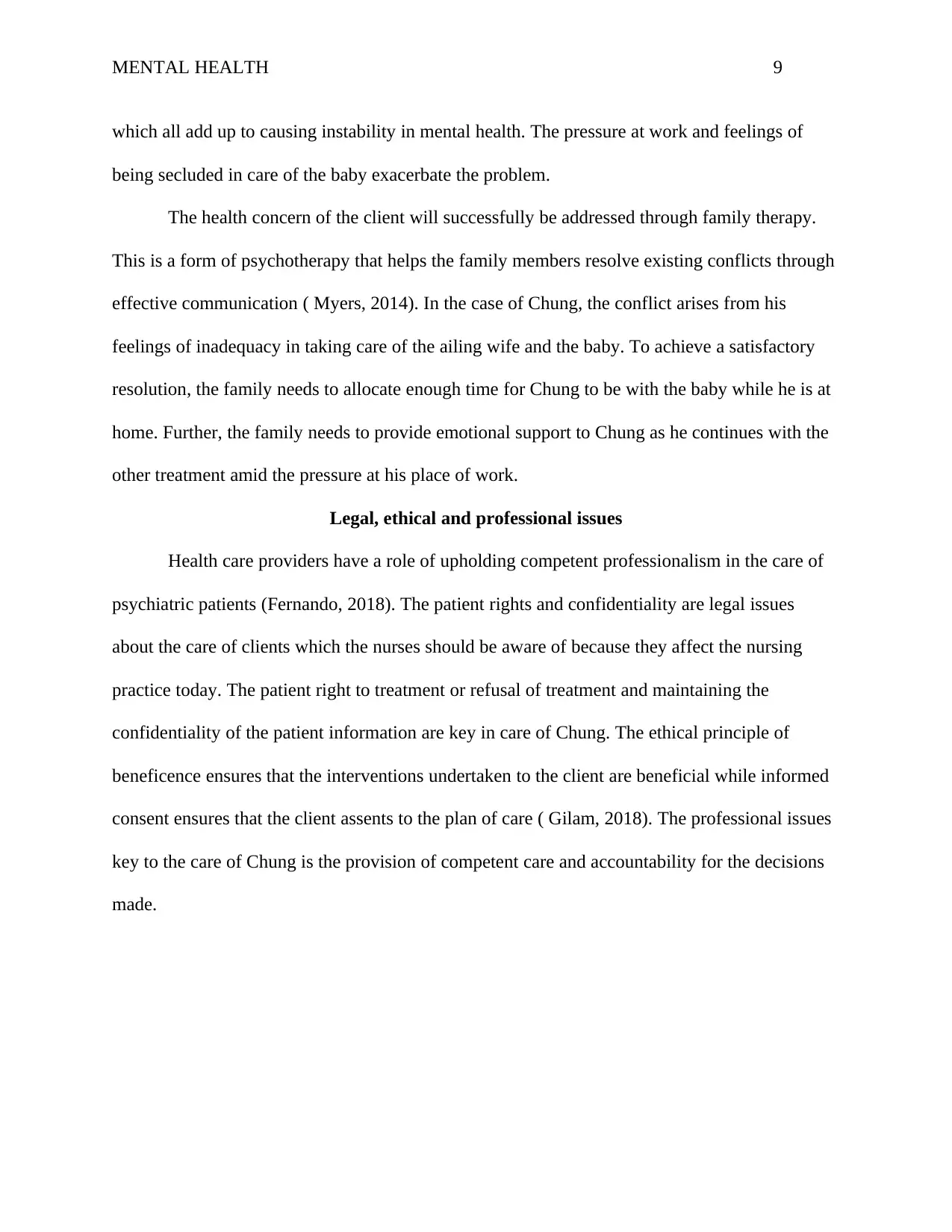
MENTAL HEALTH 9
which all add up to causing instability in mental health. The pressure at work and feelings of
being secluded in care of the baby exacerbate the problem.
The health concern of the client will successfully be addressed through family therapy.
This is a form of psychotherapy that helps the family members resolve existing conflicts through
effective communication ( Myers, 2014). In the case of Chung, the conflict arises from his
feelings of inadequacy in taking care of the ailing wife and the baby. To achieve a satisfactory
resolution, the family needs to allocate enough time for Chung to be with the baby while he is at
home. Further, the family needs to provide emotional support to Chung as he continues with the
other treatment amid the pressure at his place of work.
Legal, ethical and professional issues
Health care providers have a role of upholding competent professionalism in the care of
psychiatric patients (Fernando, 2018). The patient rights and confidentiality are legal issues
about the care of clients which the nurses should be aware of because they affect the nursing
practice today. The patient right to treatment or refusal of treatment and maintaining the
confidentiality of the patient information are key in care of Chung. The ethical principle of
beneficence ensures that the interventions undertaken to the client are beneficial while informed
consent ensures that the client assents to the plan of care ( Gilam, 2018). The professional issues
key to the care of Chung is the provision of competent care and accountability for the decisions
made.
which all add up to causing instability in mental health. The pressure at work and feelings of
being secluded in care of the baby exacerbate the problem.
The health concern of the client will successfully be addressed through family therapy.
This is a form of psychotherapy that helps the family members resolve existing conflicts through
effective communication ( Myers, 2014). In the case of Chung, the conflict arises from his
feelings of inadequacy in taking care of the ailing wife and the baby. To achieve a satisfactory
resolution, the family needs to allocate enough time for Chung to be with the baby while he is at
home. Further, the family needs to provide emotional support to Chung as he continues with the
other treatment amid the pressure at his place of work.
Legal, ethical and professional issues
Health care providers have a role of upholding competent professionalism in the care of
psychiatric patients (Fernando, 2018). The patient rights and confidentiality are legal issues
about the care of clients which the nurses should be aware of because they affect the nursing
practice today. The patient right to treatment or refusal of treatment and maintaining the
confidentiality of the patient information are key in care of Chung. The ethical principle of
beneficence ensures that the interventions undertaken to the client are beneficial while informed
consent ensures that the client assents to the plan of care ( Gilam, 2018). The professional issues
key to the care of Chung is the provision of competent care and accountability for the decisions
made.
⊘ This is a preview!⊘
Do you want full access?
Subscribe today to unlock all pages.

Trusted by 1+ million students worldwide
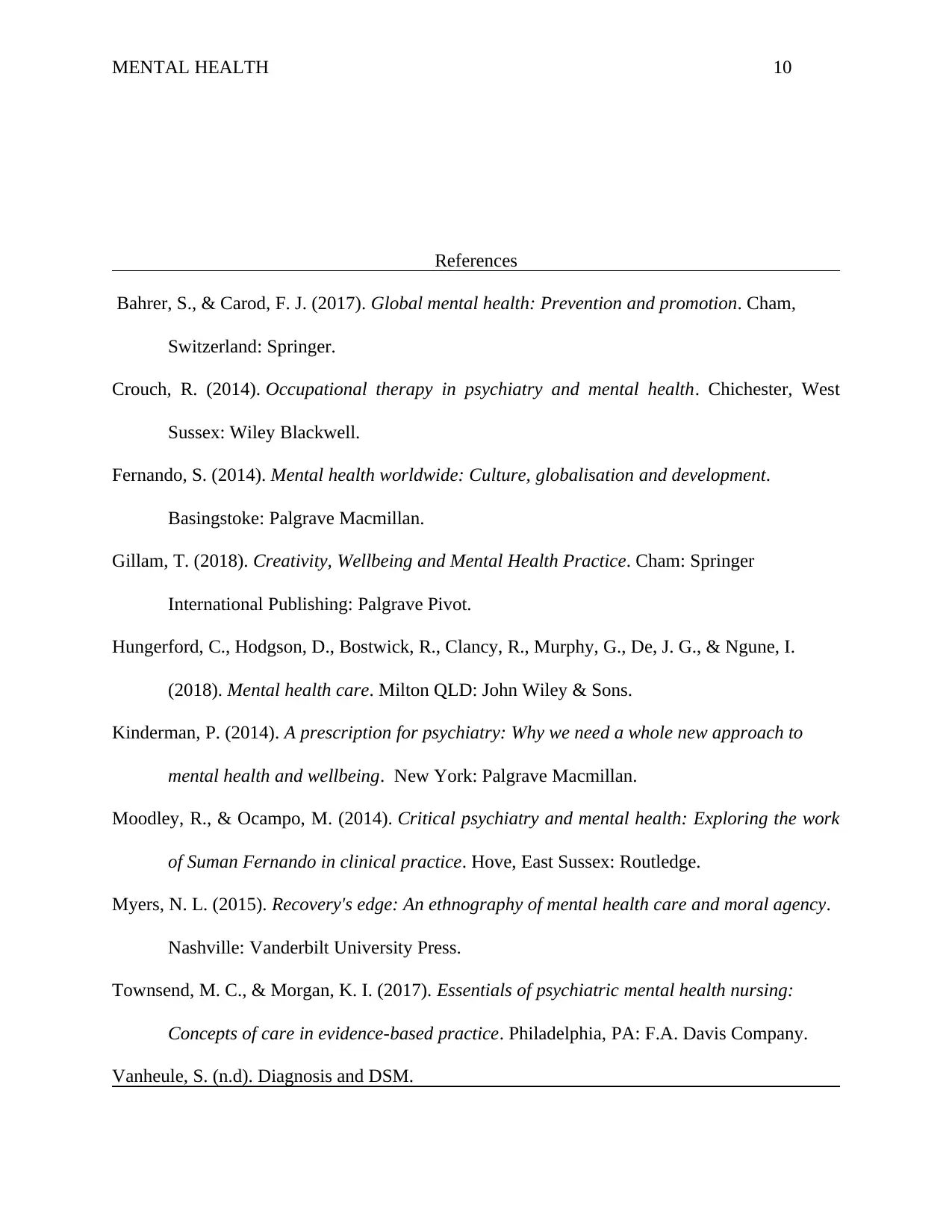
MENTAL HEALTH 10
References
Bahrer, S., & Carod, F. J. (2017). Global mental health: Prevention and promotion. Cham,
Switzerland: Springer.
Crouch, R. (2014). Occupational therapy in psychiatry and mental health. Chichester, West
Sussex: Wiley Blackwell.
Fernando, S. (2014). Mental health worldwide: Culture, globalisation and development.
Basingstoke: Palgrave Macmillan.
Gillam, T. (2018). Creativity, Wellbeing and Mental Health Practice. Cham: Springer
International Publishing: Palgrave Pivot.
Hungerford, C., Hodgson, D., Bostwick, R., Clancy, R., Murphy, G., De, J. G., & Ngune, I.
(2018). Mental health care. Milton QLD: John Wiley & Sons.
Kinderman, P. (2014). A prescription for psychiatry: Why we need a whole new approach to
mental health and wellbeing. New York: Palgrave Macmillan.
Moodley, R., & Ocampo, M. (2014). Critical psychiatry and mental health: Exploring the work
of Suman Fernando in clinical practice. Hove, East Sussex: Routledge.
Myers, N. L. (2015). Recovery's edge: An ethnography of mental health care and moral agency.
Nashville: Vanderbilt University Press.
Townsend, M. C., & Morgan, K. I. (2017). Essentials of psychiatric mental health nursing:
Concepts of care in evidence-based practice. Philadelphia, PA: F.A. Davis Company.
Vanheule, S. (n.d). Diagnosis and DSM.
References
Bahrer, S., & Carod, F. J. (2017). Global mental health: Prevention and promotion. Cham,
Switzerland: Springer.
Crouch, R. (2014). Occupational therapy in psychiatry and mental health. Chichester, West
Sussex: Wiley Blackwell.
Fernando, S. (2014). Mental health worldwide: Culture, globalisation and development.
Basingstoke: Palgrave Macmillan.
Gillam, T. (2018). Creativity, Wellbeing and Mental Health Practice. Cham: Springer
International Publishing: Palgrave Pivot.
Hungerford, C., Hodgson, D., Bostwick, R., Clancy, R., Murphy, G., De, J. G., & Ngune, I.
(2018). Mental health care. Milton QLD: John Wiley & Sons.
Kinderman, P. (2014). A prescription for psychiatry: Why we need a whole new approach to
mental health and wellbeing. New York: Palgrave Macmillan.
Moodley, R., & Ocampo, M. (2014). Critical psychiatry and mental health: Exploring the work
of Suman Fernando in clinical practice. Hove, East Sussex: Routledge.
Myers, N. L. (2015). Recovery's edge: An ethnography of mental health care and moral agency.
Nashville: Vanderbilt University Press.
Townsend, M. C., & Morgan, K. I. (2017). Essentials of psychiatric mental health nursing:
Concepts of care in evidence-based practice. Philadelphia, PA: F.A. Davis Company.
Vanheule, S. (n.d). Diagnosis and DSM.
Paraphrase This Document
Need a fresh take? Get an instant paraphrase of this document with our AI Paraphraser
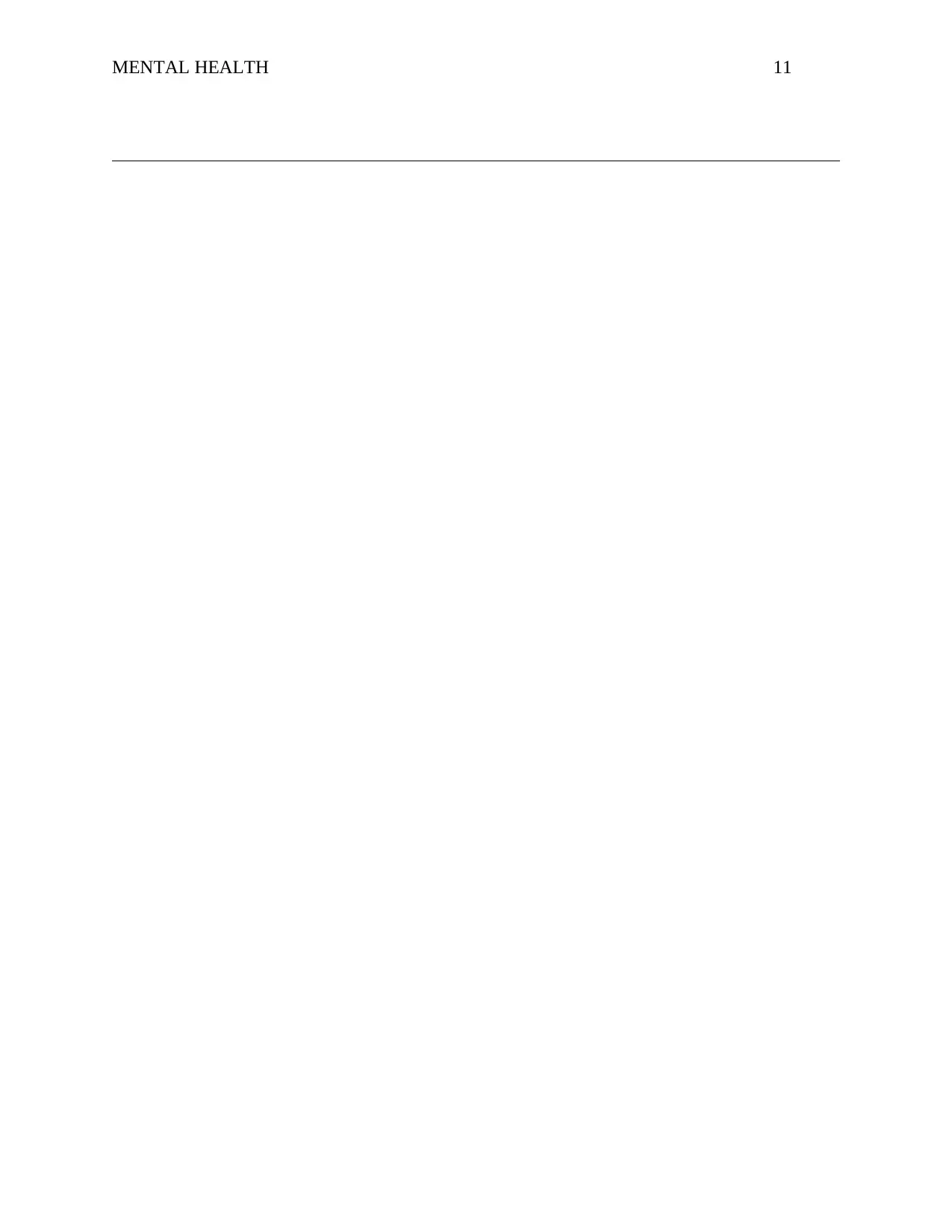
MENTAL HEALTH 11
1 out of 11
Related Documents
Your All-in-One AI-Powered Toolkit for Academic Success.
+13062052269
info@desklib.com
Available 24*7 on WhatsApp / Email
![[object Object]](/_next/static/media/star-bottom.7253800d.svg)
Unlock your academic potential
Copyright © 2020–2026 A2Z Services. All Rights Reserved. Developed and managed by ZUCOL.




